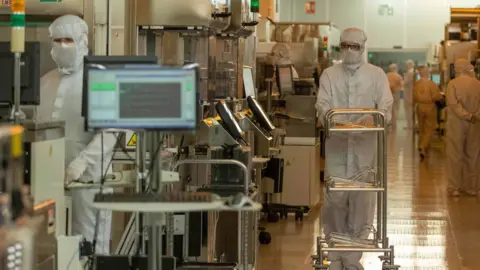In a significant move to enhance the science and technology sector, the UK government has released an ambitious £86 billion funding package ahead of the anticipated Spending Review scheduled for Wednesday. This initiative is designed to catalyze research and innovation, targeting areas such as drug treatments and advanced battery technology. The Department for Science, Innovation and Technology (DSIT) disclosed that this robust financial commitment also allocates up to £500 million for local regions across the UK, empowering community leaders to influence and decide on the specific investment strategies that best address local needs.
Chancellor Rachel Reeves is slated to unveil comprehensive departmental spending plans, which will encapsulate daily operational budgets and long-term investment strategies intended for the upcoming years. Reeves emphasized that this investment not only promises to bolster job creation but also aims to enhance the nation’s security. However, advocates from the research sector have expressed concerns, urging the government to take stronger actions to secure the UK’s esteemed position as a global leader in science.
As the government gears up to release its detailed spending plans, it has been highlighted that the science and technology budget could reach over £22.5 billion annually by 2029. The DSIT asserts that every region across the nation will derive benefits from this investment, allowing local communities to channel resources toward their unique expertise and strengths. For instance, in Liverpool, which has a burgeoning biotech sector, funding will expedite drug discovery processes. In Northern Ireland, the investment aims to enhance the development of defense capabilities, while southern Wales will utilize funds to design microchips essential for powering electric vehicles and mobile devices.
Chancellor Reeves has asserted, “Britain is the home of science and technology. Through the plan for change, we are investing in Britain’s renewal to create jobs, protect our security against foreign threats, and make working families better off.” This proclamation underscores the government’s commitment to not only transform the economic landscape but also to prioritize the welfare of working families.
While many stakeholders in the scientific community express optimism towards the financial injection, Tony McBride, the director of policy and public affairs at the Institute of Physics, highlighted a critical need for a sustained decade-long investment in workforce training. He stresses the importance of educating and equipping teachers and all educational tiers to cultivate the skilled workforce necessary to implement the envisioned industrial strategy.
Moreover, John-Arne Rottingen, the chief executive of the Wellcome Trust, a prominent charitable foundation in research funding in Britain, cautioned that challenges such as high visa costs for international scientists, financial difficulties faced by universities, and an unadjusted budget relative to inflation could hinder the government’s ambitious goals. He advocates for the UK to strive to take the lead in research intensity among G7 nations, aligning such efforts with broader economic growth and advancements in health, science, and technology.
Significantly, as the countdown to the Spending Review persists, there is an acknowledgment within the government that not all departments will receive their complete funding requests. Reeves herself has recognized the need for tough decisions amidst a backdrop of fiscal austerity, attributed to what she terms “Conservative maltreatment” of the economy. The Treasury has reiterated that any borrowing necessary will only be to facilitate investment, ensuring that day-to-day government operations align with revenue generated by taxes.
The environment leading up to the Spending Review appears contentious, with reports indicating that ministers are engaged in fierce negotiations to secure their departmental budgets. With expectations of substantial allocations—such as an anticipated £30 billion increase for the National Health Service (NHS) over the next three years—the situation is significant and indicative of the broader economic landscape affecting governmental funding decisions in the UK.
As the government’s Spending Review draws near, the focus on the £86 billion initiative displays a pivotal moment in highlighting the importance of science and technology as essential pillars for the nation’s future prosperity and security.



